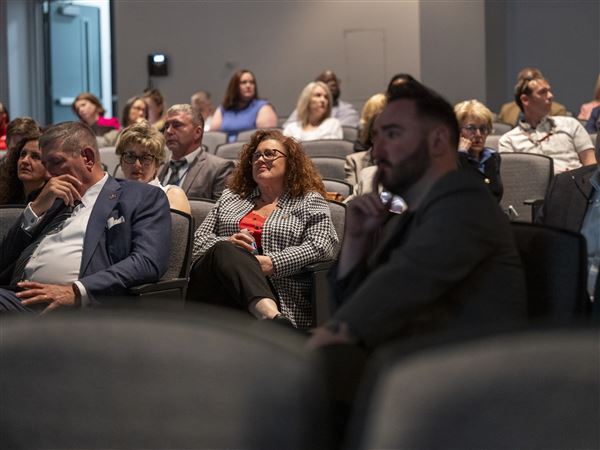WASHINGTON -- The Senate wrapped up its lobbying bill this past week, but criticisms about K Street connections are not going away any time soon for Pennsylvania Sen. Rick Santorum, whose chief Democratic opponent plans to make the issue central to his campaign over the next eight months.
Mr. Santorum's likely challenger, state Treasurer Robert P. Casey Jr., called the Senate bill a missed opportunity given the public outrage over the activities of former lobbyist Jack Abramoff, who pleaded guilty earlier this year to conspiracy in a spectacular fraud and bribery scheme.
Mr. Casey said he could not understand why Mr. Santorum and other senators rejected the call for more scrutiny from a proposed independent Office of Public Integrity, which would have investigated ethics complaints against senators.
Mr. Santorum "started this process trying to be a lion and he's going out like a lamb," Mr. Casey said. "He's not aggressively insisting on the kind of ethics reform that I would in the Senate. ... It ought to be real and comprehensive, not some kind of piecemeal approach that doesn't get to the heart of the problem."
In a hint of what's to come, Mr. Casey laid out a six-point ethics proposal last fall in what amounted to the first plank of his campaign platform. And his campaign has been relentlessly critical of Mr. Santorum's outreach to the lobbying community.
The issue falls neatly into the broad Democratic charge, already shaping a number of 2006 campaigns, that Republicans have fostered a "culture of corruption" in Washington.
Mr. Santorum has taken the most heat for the meetings with prominent Republican lobbyists he assembled at the Capitol once every week or two as the leader of the Senate's Republican Conference. The senator has said the meetings centered on getting the party's message out, but he has acknowledged that he discussed job openings at top lobbying firms and lists of potential Republican applicants with his guests. Mr. Casey charges that Mr. Santorum's discussions amounted to undue influence and possibly coercion.
But in recent months, Mr. Santorum has said those meetings were not part of the now notorious "K Street Project" -- an effort by powerful Republicans, including former House Majority Leader Tom DeLay and conservative activist Grover Norquist, to boost the influence of the party by increasing lobbyists' campaign contributions. Firms that did not comply were warned that they might have trouble with their agenda on Capitol Hill.
To highlight the issue in the 2006 campaign season, Democrats insisted on a "K Street" amendment in the Senate's lobbying bill, which Mr. Santorum supported both in a vote during the Senate rules committee's drafting of the legislation and when the measure came up for final adoption.
The measure amends the Senate code of conduct by prohibiting members from "attempting to influence" on the basis of party affiliation "the hiring or employment decisions of a firm by promising or threatening to take or withhold legislative action."
A number of ethics lawyers have pointed out that those kinds of activities are already illegal, and Mr. Santorum has said his conversations about job openings never came anywhere close.
To insulate Mr. Santorum from criticisms about his frequent meetings with lobbyists, Senate Majority Leader Bill Frist, R-Tenn., tapped Mr. Santorum to lead their party's efforts on the lobbying bill, noting that, as a young House member, Mr. Santorum and a half dozen other young members had helped expose scandals in the House bank and post office.
And even though Mr. Santorum was not an author of the final bill passed last week, his Republican colleagues showered him with praise on the Senate floor for "laying the foundation" for the legislation.
Mr. Casey scoffed that members of Mr. Santorum's party were simply "propping him" and said if Mr. Santorum was serious about reform, he should eschew perks such as the ability to borrow corporate jets for official or campaign travel. Senate and House members now only have to reimburse those companies for the price of a first class ticket. Mr. Santorum tried to amend the bill by requiring Senators who ride the jets to pay a pro-rata share of the cost of a chartered flight, but Mr. Casey has sworn off the flights altogether after using a law firm's jet last year.
Mr. Santorum retorted that he "plays by the rules that are in place" and said Mr. Casey was entitled to make up his own if he wished.
"Unlike Bob Casey, I've got a record on reforming the House, now on reforming the Senate," Mr. Santorum said. "My opponent has a record that is devoid of any kind of real reform in anything he's ever done. And other than mouthing Democratic talking points on issues about 'K Street,' he's contributed nothing to the final product that passed the United States Senate."
First Published: April 2, 2006, 5:00 a.m.















